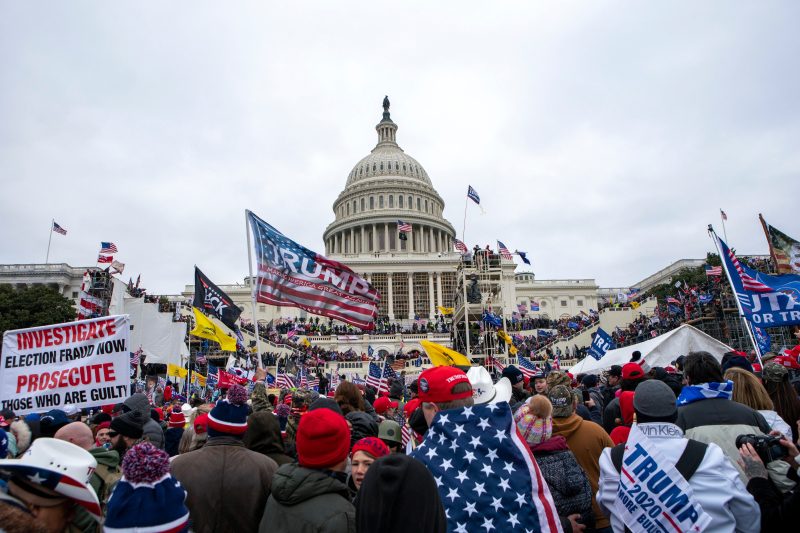It is easy to both over- and underestimate the scale of former president Donald Trump’s support nationwide. It is not the case that “half” the country supports him, despite the shorthand that he and others like to use. But it is the case that tens of millions of Americans do and take at face value his assertions about politics and culture.
That means that there is a huge audience for evidence that would seem to support his claims. The film “2000 Mules” offered a noncredible case that rampant fraud cost Trump the 2020 election, but since there was demand for “evidence” to that effect, it became a right-wing blockbuster. Economics of scale: If you can get 5 percent of an audience of 50 million to give you $5, you just made more than $12 million.
I am not arguing that the cover story of Newsweek this week was intentionally written to make a similar appeal to the Trump-supporting right. The once-respected magazine’s increasing support of the political right is well documented, so it’s possible. But it is not surprising that the assertion outlined in its headline — “Donald Trump Followers Targeted by FBI as 2024 Election Nears” — has been embraced as revelatory by Trump’s base.
That’s despite the lack of evidence within the article itself for this explosive claim.
That’s the fundamental problem with the report, written by William Arkin: That case is not made. Arkin presents some numbers and quotes, but none add up to “FBI singling out Trump supporters,” as the headline implies. Instead, it describes a new threat category created by federal law enforcement that includes people inspired to violent action by Trump — but also violent actors inspired by other ideologies and candidates. That may be a shift in the FBI’s approach, as Arkin argues, but it isn’t one aimed at broadly targeting Trump supporters.
Here’s the heart of Arkin’s argument, describing the extension of the group seen as “anti-government or anti-authority violent extremists” (AGAAVE):
That last paragraph is crucial. Notice that the insiders don’t claim it only applies to Trump supporters or even only to political violence from Trump supporters. This is a Logic 101 test question: Just because everything in Set A belongs to Set B does not mean that Set B only includes things from Set A. The word “felony” applies to bank robbery, but that doesn’t mean that “felony” only describes bank robberies.
In fact, an FBI document dated June 2023 and published in July offers several examples of what sorts of actions count as AGAAVE-Other. There was Cesar Sayoc, the Trump supporter who sent inert bombs to members of the media. But there was also James Hodgkinson, the man who shot at Republican lawmakers in Virginia in 2017.
The examples in the FBI document include a New York man who threatened Rep. Marjorie Taylor Greene (R-Ga.) and a Florida man who threatened people involved in the Capitol riot. They also include the man who brought a rifle to an FBI field office in Ohio after the search at Mar-a-Lago. It is a disparate grouping of ideologies with one thing in common: violent threats or action linked to political views.
A lot of Arkin’s argument (and data) centers on the arrests related to the riot. (The FBI document notes that “[t]threats from these [domestic violent extremists] have increased in the last two years.”) Since the earliest days of the Biden administration, the government’s efforts to arrest and charge those involved in the riot has been presented not as a response to criminality but as a political crackdown. Tucker Carlson, back when he was on Fox News, was beating this drum within a week of Biden being inaugurated.
Arkin quotes an FBI officer who offers an argument for why this new category means “Trump supporters.”
“Obviously if Democratic Party supporters resort to violence, [AGAAVE-Other] would apply to them as well,” the officer said. “It doesn’t matter that there is a low likelihood of that. So yes, in practical terms, it refers to MAGA, though the carefully constructed language is wholly nonpartisan.”
This is an important point! Extremist incidents and killings have in recent years been overwhelmingly a function of right-wing actors. The surge in federal arrests in 2021 was because a number of Trump supporters were arrested for rioting at the Capitol. Were there a surge in left-wing political violence, as occurred in the 1970s, this same category would apply to them. But that’s not the reality of the moment.
If the vast majority of felonies were bank robberies, it would be tempting to argue that “felony” is just a term for “bank robbery.” But it isn’t.
There’s another level of refitting the FBI’s definition at play here, and a familiar one. Arkin more than once refers to “Donald Trump’s army of MAGA followers” in some form, implying that Trump supporters are almost necessarily violent actors, soldiers for the former president. But the FBI is focused on violence, not on the movement. It’s rhetorically useful for Trump’s base to present themselves as uniform targets of federal law enforcement, as occurred when the Justice Department released a statement about combating threats against school officials. But for hopefully obvious reasons, attempting to surveil or track millions of people who have made no threats or taken no violent action is not something in which the FBI is or could be engaged.
The image and text on the cover of Newsweek are not subtle: Showing a group of Trump supporters from Jan. 6, the magazine teases, “THE ENEMY WITHIN? Exclusive: The FBI targets MAGA as the 2024 election nears.”
But many of the people shown in the photo, as Newsweek’s editors might not be aware, are members of the Proud Boys. The guy in front is Joseph Biggs, sentenced to 17 years in prison for his role in helping orchestrate the group’s response to the effort to finalize Joe Biden’s 2020 victory. The June FBI document refers (though not by name) to Proud Boys chairman Enrique Tarrio as AGAAVE-Other, noting that he, Biggs and three others were indicted on a charge of seditious conspiracy.
Few would argue that the FBI should not be tracking the threat posed by groups like the Proud Boys, whatever category they might fall into. But most Trump supporters, it’s safe to assume, would also not categorize themselves as equivalent to the Proud Boys. Arkin fails to make the case that the FBI does, either.








